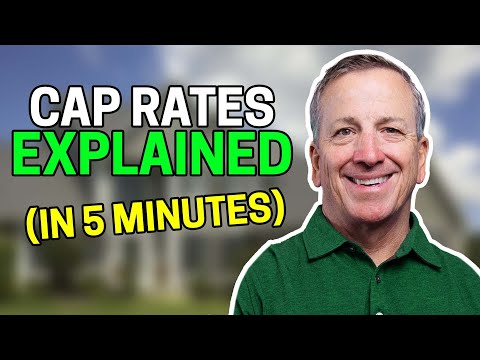Catching a Good Cap Rate: Unraveling the Secrets of Immense Profit
You’ve likely heard about the capitalization rate (you may know it better as ‘cap rate’) in the real estate buzz. It’s a nifty measure used by savvy investors to evaluate potential investment properties. But, what makes a good cap rate, and how can you use it to drive stellar profits?
Understanding the Nuances of a Good Cap Rate
By simple definition, a cap rate measures a property’s potential return in the first year of ownership, assuming you buy the property in cash. It’s similar to how you’d weigh out your potential profits on a stock investment. But unlike the stock market, which is unpredictable, real estate values typically remain steady, meaning a good cap rate can be more consistently achieved.

The Balance Between Risk and Return: The Cap Rate Conundrum
Juggling risk and return is like arranging too many balls in too few hands. A higher cap rate usually implies a higher level of risk, but also the potential for higher returns. By comparison, a lower cap rate often means lower risk but an extended timeline to hit the jackpot. Finding the sweet spot in this equation is the real key to securing the optimal ‘what is a good cap rate?’ answer.

Answering: What Is a Good Cap Rate?
The ‘what is a good cap rate?’ question isn’t as one-size-fits-all as you might think. It requires a carful consideration of a variety of elements.
Unveiling the Ideal Cap Rate Range
Market pundits suggest a desirable cap rate is typically between 5% and 10%. The specifics will be contingent on the property type and location. One can summarize this spiel in a What Is a co borrower type analogy that pairs risk and return side-by-side for a comprehensive perspective.
Market Specifics Influencing the Cap Rate Value
Beyond property type and location, other market conditions can sway the cap rate value. These could include anything from local economic factors to the property’s condition to the intensity of the competition. Assessing these will help refine the numbers and perfect the cap rate formula for each scenario.
Breakdown: Is a 7% good cap rate?
Generally, a cap rate of 7% is viewed as solid. But before you sign off on that property, make sure you’ve looked at the bigger picture. A good cap rate depends on many other factors as well, such as location, property type, and market conditions.
Decoding the Cap Rate Commercial Real Estate Scenario
Peculiarities of the Cap Rate in Commercial Real Estate
Commercial real estate and cap rates share a peculiar relationship. This stems from the ‘purchase synonym’ scenario for commercial properties, where investors are usually seeking to obtain much higher returns than residential properties.
The Strive for Higher Returns: Is a 20% Cap Rate Good in Commercial Real Estate?
A 20% cap rate might seem like a windfall, but don’t mistake a high number for an assured win. Aside from large funds and institutional investors who might favor lower cap rates, most individual investors and realty pros are seeking opportunities that can offer 10% to 20% cap rates in commercial real estate. But remember, on the road to profit, risk is often the unwanted passenger.

Mastering the Cap Rate Formula for Maximum Gain
Exploring the Mathematical Side of Cap Rates
Breaking down the numerical complexities of cap rates is crucial to maximizing not only your profits but your understanding of this key investment tool. So, how to do this? Simple, use the Noi formula to calculate your potential operating income and then divide this figure by the property’s market value. This is your cap rate!
Applying the Cap Rate Formula in Real Life
Use this cap rate formula consistently, treating it as a constant in your purchasing decision framework. Much like you need a dependable compass to navigate through the Turks And Caicos Flights, the cap rate formula can help steer your investments towards prosperous terrain.
Diving into the Intricacies of ‘Good Cap Rate’
Understanding the Variables: Location, Property Type, and Market Conditions
Think of the cap rate as a multi-faceted gemstone, with each facet representing a different variable – location, property type, and market conditions. Understanding these elements and their interplay is key to determining a truly good cap rate. This isn’t a one-off game, but a continuous process of understanding What Is Noi in real estate, tweaking your strategies, and making informed realty decisions.
Delving into the Specifics: Is 12% a Good Cap Rate?
A 12% cap rate might sound like music to an investor’s ears. But remember the saying: All that glitters is not gold. A higher cap rate might be great for some properties, but not necessarily for all. In some cases, a cap rate this high could indicate properties in distressed condition or in less desirable locations.

‘Purchase Synonym’ Strategy: Acquiring High Cap Rate Properties
Acquiring (Purchase Synonym) High Cap Rate Real Estate Ventures: Is It Worth It?
Grabbing a high cap rate property can feel like striking gold. But is it always worth it? The answer: only if you’re ready to take on a higher risk. High cap rate properties often come with a larger potential payoff but they also bring on potential issues that can dig into your profits.
Real Estate Pursuit: Is an 11 Cap Rate Good?
An 11% cap rate is often seen as a good cap rate. However, as we’ve noted before, remember to weigh this against other factors such as location, property type, and the state of the market. Always factor in these considerations before making your final purchasing decision.

The ‘Good Cap Rate’ for Rental Properties: What do Investors Aim for?
Unpacking the Ideal Cap Rate for Rental Properties
When looking at rental properties, many investors aim for a cap rate between 8% and 12%. But, before you set off on your rental property investment venture, recognise that while the cap rate is a valuable tool, it isn’t the only thing that should guide your choices.
The Airbnb Investment: The Role of Cap Rate in Decision Making
Considering the Airbnb scene? With the sharing economy booming, many argue that a 10% cap rate is where the sweet spot lies. However, again, your specific percentage isn’t the only factor in determining whether this investment avenue is right for you.
Unraveling the Mystery: A Good Cap Rate Depends
Dissecting the ‘It Depends’ Argument: Factors Influencing a Good Cap Rate
Ultimately, a good cap rate depends on several factors. This isn’t a concrete answer, but it is a realistic one. Every investment is influenced by numerous variables – from the property’s location to the uniqueness of the buyer’s perspective in assessing How To find operating income.
Navigating Through Real-Life Scenarios: How to Find Your Ideal Cap Rate
To chart your course to real estate success, firstly familiarize yourself with the real estate landscape and then, drawing from your acquired insight, ascertain your comfort level in terms of risk and return. Employing these practices will ensure you find your ideal cap rate.

Wrapping Up the Good Cap Rate Saga
Revisiting Key Takeaways: How to Leverage Cap Rate Strategies for Maximum Gain
In conclusion, identifying a good cap rate is not always about landing the highest number. It often requires a prudent investigation into the involved risk factors, consideration of market dynamics, and the careful application of the cap rate formula.
The Cap Rate Investment Journey: Charting Your Course Towards Immense Profit
In the final analysis, identifying a good cap rate comes down to achieving a rewarding balance between risk and return. It’s about understanding market conditions, reckoning with the property’s peculiarities, and then making supremely informed decisions. This cap rate journey, if treaded with patience and insight, can lead you straight towards colossal profits. So embark boldly, but wisely, on your real estate journey today!



